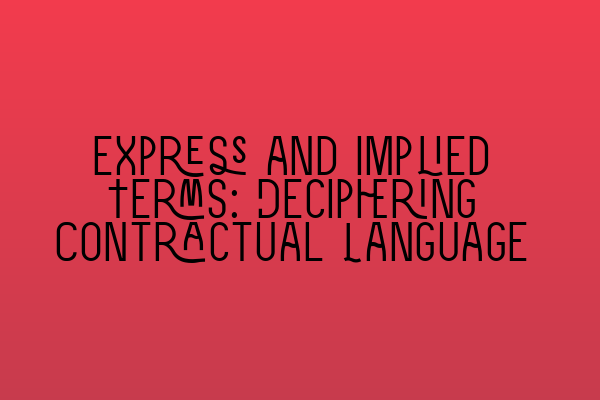Express and Implied Terms: Deciphering Contractual Language
Contracts are a fundamental aspect of business, governing the relationships and transactions between parties. When entering into a contract, it is crucial to have a clear understanding of the terms and conditions laid out within it. These terms can be express or implied, and their interpretation is key to ensuring the enforceability and success of the contract.
Express Terms
Express terms refer to the formal and explicit clauses that the parties have agreed upon and included within the contract. These terms can be in written or oral form, as long as they are clearly communicated and agreed upon by both parties. They outline the rights, obligations, and expectations of each party and provide a framework for the performance of the contract.
Express terms can cover various aspects of the contract, such as the price, delivery dates, payment terms, quality standards, and dispute resolution mechanisms. These terms are often negotiated during the contract formation stage and are essential in determining the parties’ intentions.
However, it is crucial to ensure that express terms are drafted in a clear and unambiguous manner to avoid potential disputes or misunderstandings. It is recommended to seek legal advice to ensure the precise and effective drafting of express terms in accordance with the relevant legal principles. Access to SQE 1 Practice Exam Questions can provide practical examples and scenarios to enhance your understanding of express terms.
Implied Terms
Implied terms, on the other hand, are not expressly stated but are nonetheless incorporated into the contract by operation of law or by the parties’ conduct and industry practice. These terms are deemed to be part of the contract based on the context, custom, or legal obligations, ensuring that the contract operates fairly and reasonably.
Implied terms can arise from various sources, such as statute law, common law, or trade usage. Statute law may impose certain terms on specific types of contracts to protect consumers or regulate industry practices. Common law may imply terms to fill gaps or provide necessary protections that were not specifically addressed by the parties. Trade usage refers to customary practices within a particular industry that can be deemed as implied terms in contracts within that industry.
The interpretation of implied terms can be complex, as it involves assessing the intention of the parties and the surrounding circumstances at the time of contract formation. It requires a careful analysis of the contract language, the nature of the transaction, and the parties’ understanding and expectations. SQE 1 Practice Mocks FLK1 and FLK2 can help you familiarize yourself with different scenarios and contexts involving implied terms.
Interpreting Contractual Language
The interpretation of contractual language is essential in understanding the parties’ intentions and giving effect to their agreement. Courts follow established principles of contractual interpretation to decipher the language used and determine the meaning and effect of the terms.
When interpreting contractual language, courts consider various factors, including the words used, the context, the purpose of the contract, and the commercial common sense. The primary objective is to give effect to the parties’ intentions while considering the ordinary and natural meaning of the words used.
However, if the language remains ambiguous or unclear, courts may resort to additional aids and extrinsic evidence to resolve the ambiguity. This can include examining the parties’ negotiations, the background circumstances, and the subsequent conduct of the parties. Such evidence may help to shed light on the parties’ shared intentions and help in resolving any interpretational uncertainties.
Ultimately, it is crucial to draft contractual language in a precise and unambiguous manner to avoid ambiguity and potential disputes. Comprehensive knowledge about contract law and interpretation techniques can significantly enhance your ability to draft clear and effective contractual terms. SQE 2 Preparation Courses can provide in-depth knowledge and skills necessary for understanding and interpreting complex contractual language.
Conclusion
Understanding the distinction between express and implied terms is crucial in interpreting contractual language and ensuring the enforceability and success of a contract. Express terms set out the explicit rights and obligations of the parties, whereas implied terms fill gaps and provide necessary protections based on statutory law, common law, or trade usage. Interpreting contractual language requires a careful analysis of the parties’ intentions and the surrounding circumstances, following established principles of interpretation.
To excel in contract law and legal practice, it is important to continuously enhance your knowledge and skills. SQE 1 Preparation Courses and access to SQE exam dates can help you schedule and plan for your exams while SQE 2 Preparation Courses can provide you with the necessary expertise to navigate complex contractual language effectively.
By continuously improving your understanding of express and implied terms and mastering the art of interpreting contractual language, you can become a skilled contract law practitioner, ensuring the success of your clients’ contracts and transactions.
Sources:
- SQE 1 Practice Exam Questions
- SQE 1 Practice Mocks FLK1 FLK2
- SQE 2 Preparation Courses
- SQE 1 Preparation Courses
- SRA SQE Exam Dates
